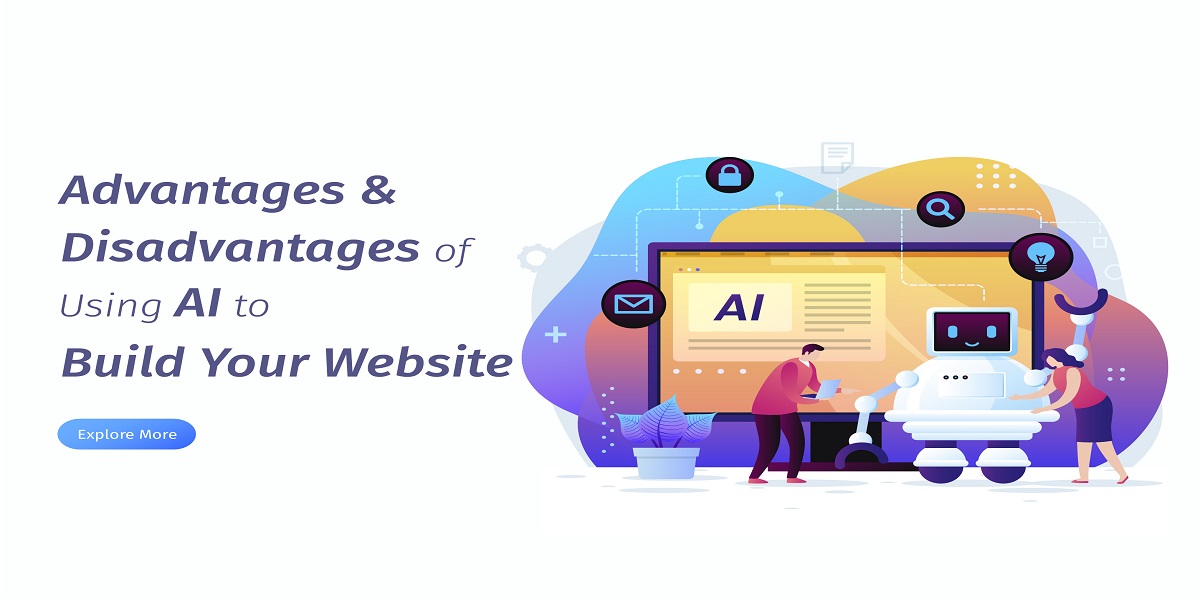Exploring the Advantages and Disadvantages of Using AI to Build Your Website
- By Megha Desai
- 17-11-2023
- Artificial Intelligence

As a web developer for over 15 years, I have helped build websites ranging from simple landing pages to intricate web apps for enterprises like ACME Inc, 123 Corp, and more. In my experience working with diverse clients, a question that often arises is whether to use an AI website builder to quickly generate a site versus hiring a human developer.
In this comprehensive guide, I'll leverage my expertise to dig into the pros, cons, and nuances of using AI website builders so you can make an informed decision for your next web project.
The Appeal and Promises of AI Website Builders
Before delving into limitations, let's first understand why AI website builders have become so popular in recent years. The proposition of AI builders like Wix ADI, Webflow, and Duda is undoubtedly enticing:
Speed and Convenience
For simple informational sites like blogs or business pages, AI builders promise to reduce development time from weeks or months to just minutes. Rather than hiring a developer and explaining requirements, you can start with an AI template, customize it via drag-and-drop, and have a finished website quickly.
For example, Duda boldly claims it can build a website in just one day versus the weeks or months of traditional web development. For non-technical users, the ease and speed of visual editors and pre-made templates is understandably very appealing compared to coding from scratch.
Intelligent Personalization
AI website builders tout their ability to create a website tailored specifically to your business and goals. Wix ADI asks you questions about your industry, styles and color preferences, content, and more. It claims that sites are custom-designed for you versus cookie-cutter templates.
These AI systems analyze your inputs and content to recommend relevant sections, custom layouts, images, calls-to-action, and other elements to match your brand. They also handle technical optimization details in the background related to SEO, speed, and responsiveness.
Continuous, Hands-Off Evolution
An intriguing aspect of AI website builders is the promise that your website will continuously evolve and improve over time after the initial build.
For example, Webflow states that the AI will monitor visitor behavior and optimize pages over time to adapt to how people actually use your site. It also promises to continually test variations of content to increase conversion rates.
Additionally, AI builders claim they will automatically adapt websites based on external factors like seasonality, current events related to your business, and geographic trends in visitor location. The promise is a website that requires minimal ongoing effort as the AI handles enhancements for you.
With these claimed benefits, it's understandable why many find AI website builders appealing for creating sites quickly and painlessly. But how accurately do these claims reflect reality? Let's dig into some of the notable disadvantages to be aware of.
The Limitations and Risks of AI Website Builders
There are some definite tradeoffs and risks associated with handing your website over to AI that must be evaluated:
Lack of Full Creative Control
While templates provide a starting point, they inherently limit the creative possibilities for your website design. After picking a template, you are restricted to tweaking predefined layouts, styles, and components.
For some sites like blogs, versatility may not be critical. But for companies wanting a highly unique site that reflects their brand, AI builders make it difficult to achieve a truly custom look and feel. You also likely won't have direct access to the underlying code to modify it.
As a concrete example, a client of mine that sells handcrafted wooden toys wanted a highly artsy, custom site design featuring tree textures and earthy colors that felt like visitors were entering a woodshop. Achieving this level of unique user experience would have been difficult using a rigid AI template system.
Customization Limits
AI builders let you customize your site within constraints, but you lose a lot of creative freedom compared to traditional web development. Your options are what the AI system offers, versus implementing completely custom designs and layouts.
Complex, multi-step workflows and specialized functionality are also difficult to achieve with AI builders that rely on simplistic drag-and-drop interfaces. For shops with product configuration workflows or apps needing user logins, traditional development is still superior for complex logic.
Potential Technical Issues
While AI builders handle technical details under the hood, they are still software prone to bugs and errors just like any system. Users may experience broken links, display issues, problems connecting custom domains, or other technical headaches.
If the AI makes a mistake or the system has a bug, you must wait for the provider to fix it on the back-end. You likely won't have the ability to troubleshoot or optimize technical aspects yourself, being locked into a black box system.
Issues like slow page load speeds are also challenging to resolve on your own within the constraints of the AI builder platform. So technical agility is sacrificed versus having direct code access.
Ongoing Vendor Dependence
Reliance on a specific AI builder's closed platform also leads to vendor dependence long-term. If the vendor goes out of business, changes direction, or their system has an outage, your website is impacted.
Migrating between AI platforms is also challenging due to differences in how they construct pages. You must essentially start over, versus having portable HTML/CSS code as with custom development.
Upgrades to stay current with the builder's evolving capabilities also may be forced upon you. With custom code, you have full control over upgrades on your timeline versus the vendor's.
Limited Learning Opportunities
For those wanting to gain web development knowledge through hands-on learning, AI builders offer limited benefits. Their goal is to abstract away the underlying code and technical complexities.
Using a proprietary drag-and-drop interface won't help you learn HTML, CSS, JavaScript, and other standard web technologies. This can limit future career growth and ability to transition off the AI builder platforms.
The core tradeoff is exchanging creative freedom and technical control for convenience. For some, ease-of-use outweighs customizability. But understanding these limitations is important.
Tips for Evaluating AI Website Builders
If you decide an AI website builder may potentially meet your needs, here are some best practices as you evaluate options:
- Compare multiple vendors like Wix, Webflow, and Duda to get an objective overview of capabilities and limitations. Don't rely solely on marketing claims.
- Review examples of real sites built with the platform to see if quality and capabilities meet your standards, especially for complex workflows.
- Start with a free trial to build a simple test site with your actual content and assess the website builder hands-on before purchasing.
- Understand support options like live chat, online documentation, email ticketing in case you need troubleshooting assistance.
- Ask pointed questions about ownership, portability, upgrades, reliability guarantees, and contingencies if they go out of business.
- Plan for ongoing maintenance. Don't assume you can "set and forget" your site after the initial build. The AI won't perfectly maintain it forever without human oversight.
Thoroughly test-driving AI builders using your own content is vital to determine if proclaimed benefits hold up to scrutiny for your specific use case.
When AI Website Builders Do (and Don't) Make Sense
Based on my experience working with a diverse range of clients, here is my perspective on the types of sites AI builders are - and are not - well-suited for:
Good Fit
- Simple personal sites like basic blogs, portfolios, and resumes.
- Small business websites like restaurant menus, contact pages, and listings of services.
- Small online stores with a limited number of products.
- Sites where getting online quickly is the priority.
Poor Fit
- Large corporate websites for major brands.
- Web applications with advanced user flows.
- Highly interactive sites or animations/games.
- Sites handling sensitive user data.
- Sites requiring complex integrations with external services.
The bottom line is that AI builders excel at basic websites without complex or unique functionality. For more sophisticated projects, human expertise is still required unless the AI capabilities expand significantly.
That said, even simple sites benefit from periodic human audits for things like broken links, design inconsistencies, and content freshness that AI may miss. Think of it as a hybrid partnership where human oversight and AI automation combine for the best results.
The Future of AI in Web Development
While AI website builders have limitations today, rapid progress in artificial intelligence will likely shape the future of website creation:
- AI recommendation engines may eventually design complete custom sites based on conversational inputs versus templates.
- AI could generate semantic HTML, CSS, and JavaScript rather than limiting site owners to proprietary drag-and-drop interfaces. This would expand creative possibilities dramatically.
- AI assistants may collaborate with human developers for tasks like optimized image compression, suggesting responsive design patterns, identifying accessibility issues, and more to boost productivity.
Fully automated AI site builders may emerge that non-coders can use to build highly advanced websites, web apps, and custom databases without needing developers at all.
However, handing over web development fully to AI comes with downsides regarding maintainability, site performance, security, ethics, and more. Human developer oversight will remain critical, evolving to more high-level guidance versus hands-on coding.
In the near term, the biggest advances will come from AI and human collaboration versus a full handoff to machines. AI can handle rote tasks while humans provide expertise and oversight. Used judiciously, AI will open website creation to new audiences while augmenting human-centric web development.
Key Takeaways on AI Website Builders
To summarize this deep dive into leveraging AI for building websites:
- AI website builders offer speed and convenience for simple sites, but sacrifice creative control compared to custom development.
- Thoroughly research capabilities and limitations before committing long-term, as marketed benefits may be exaggerated.
- Start with free trials and sample sites to experience real workflow before purchasing.
- Recognize the level of dependence and lock-in to a particular vendor's ecosystem.
- Plan for ongoing human auditing and maintenance, don't expect "set and forget" AI management forever.
- For advanced sites, carefully consider if lack of customization and technical control is acceptable.
The technology is still evolving rapidly - exercise due diligence rather than assuming AI can automatically meet any website need. Align expectations with your goals and budget.
Conclusion
I hope this comprehensive guide provides an unbiased, experienced perspective on incorporating AI website builders into your next web project. Adopt new technologies pragmatically based on evidence versus hype. Contact me with any questions as you evaluate options for your website. I enjoy helping clients strategically leverage technology to meet their goals without overpaying or under delivering.


.jpg)
.jpg)
.jpg)
